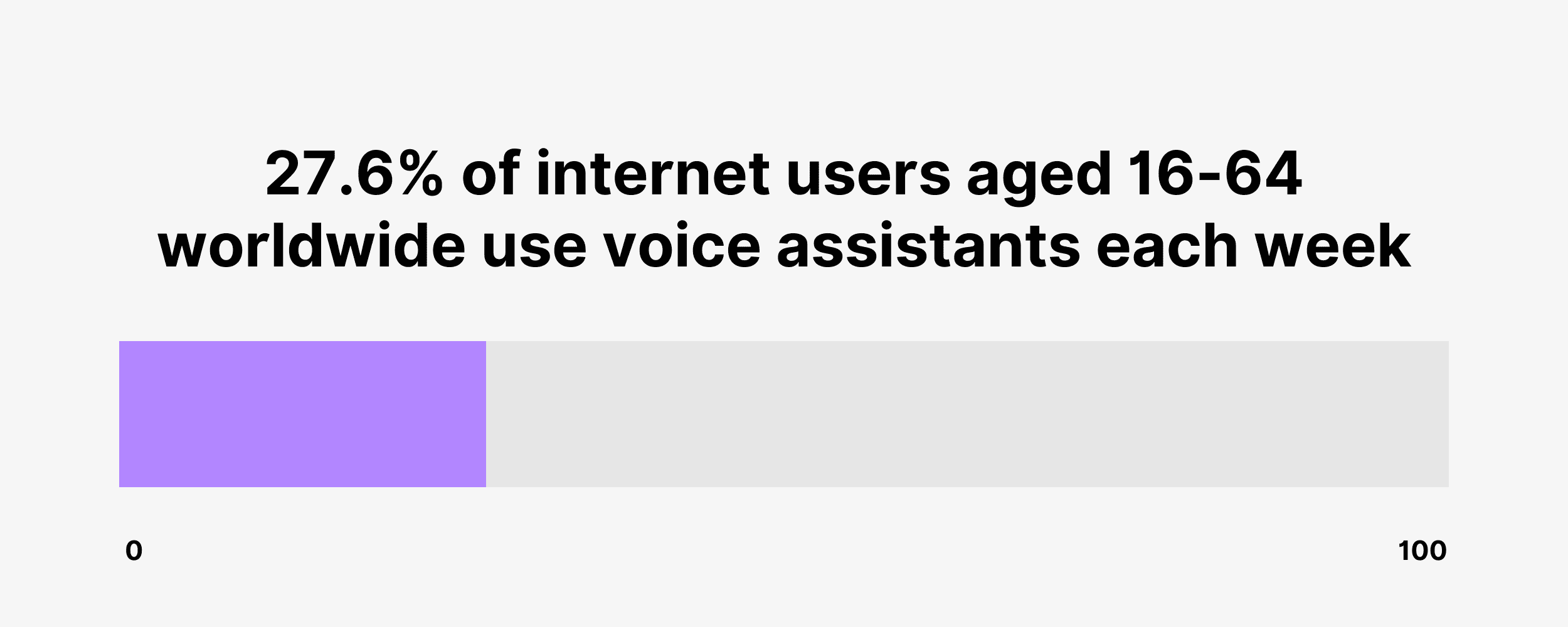29 Fascinating Voice Search Statistics
A lot of people say that voice search is “the next big thing” in the digital marketing world.
But is there data to back this up?
Yes!
On this page, you’re about to see a curated collection of voice search statistics.
01. Voice Search Usage Statistics
Are more people using voice search now than before? Definitely. In fact, voice search is quickly going from a rare act to something that people do all the time. A lot of this growth is due to smart speaker devices like Amazon Alexa. Some of it is due to voice assistants being built into smartphones (Siri being a popular example). But as you’ll see in these stats, people are searching with their voices on their tablets, cars… even their desktop computers.
- 27.6% of internet users aged 16-64 worldwide use voice assistants each week (DataReportal)

- Around 98 million people in the US own a smart speaker in their household (Edison Research)
- 23.7% of US internet users aged 16+ report using voice assistants every week (DataReportal)
- On average, more men than women use voice assistants at least once per week (DataReportal)
- 40.8% of Chinese internet users use voice assistants each week, more than in any other surveyed country included in the analysis (DataReportal)
- 28% of US and UK consumers claim to use voice assistants daily (Vixen Labs)

- Nearly half (45%) of Americans report using voice search on their smartphones (Vixen Labs)
- There are around 86.1 million US smart speaker users who ask questions via voice in 2024. That’s an increase from 80.2 million inquiries in 2022 (eMarketer)
- 61.9% of Millennials in the US use voice assistants on any device (primarily on smartphones) monthly in 2024, followed by Gen Z (55.2%) and Gen X (51.9%). Only 31.5% of Baby Boomers in the US claim to use voice assistants (eMarketer)
- Mobile voice search on Google is supported in over 70 languages (Wikipedia)

02. Voice Search SEO Statistics
If you work in digital marketing, you’re probably wondering: “OK, so voice search is growing. How do I take advantage of it?” Fortunately, you don’t have to wonder or guess. This list of voice search stats about optimizing for voice search will help you tap into this emerging trend.
- After analyzing 10,000 Google Home search results, Brian Dean found that it takes an average of 4.6 seconds for a voice search result page to load (Backlinko)
- The average voice search result contains only 29 words (Backlinko)

- Websites with high domain and link authority tend to rank best in voice search (Backlinko)
- Content that has been highly shared ranks well in Google voice search – the average result has 1,199 Facebook shares and 44 Tweets (Backlinko)
- The average voice search result is written in natural language and is easy to understand (typically written at a 9th-grade reading level) (Backlinko)
- 40.7% of all answers from voice search are pulled from a Featured Snippet (Backlinko)

- Google voice search result pages have an average of 2,312 words (Backlinko)
03. Consumer Preferences & Trends
So it’s clear that voice search is here. And it’s real. But why do people search for certain things with their voice and not others? And what devices do they use most often? Here’s what the stats have to say.
- Asking questions without typing is one of the top 3 reasons consumers purchased a smart speaker (Edison Research)
- The top 3 devices where consumers use their voice assistants are: smartphones (56%), smart speakers (35%), and TVs (34%) (Edison Research)

Here are the exact numbers:
Device Voice Assistant Usage (Total US Online Population 18+) Smart speaker 35% Smartphone 56% TV/TV remote 34% Car 29% Computer/laptop 24% Tablet 24% Household appliances 12% - Smart speaker owners will typically request nearly 11 different tasks via voice each week (Edison Research)
- 34% of Americans own a voice-activated smart speaker (Edison Research)
04. Purchasing Using Voice Search
Voice search is great for SEO and content marketing. But can it actually lead to more sales? Let’s find out.
- Purchase-related terms do not rank among the most popular voice searches, which tend to focus on instructions such as playing music or setting alarms (Search Engine Land)
- 38.8 million people in the US use smart speakers for shopping-related activities (researching products or adding products to a shopping cart using voice), accounting for 13.6% of the population (eMarketer)
- 8% of US adults claim to use voice shopping regularly (eMarketer)

- More the one-third (35%) of American adults are interested in voice shopping but do not currently use it (eMarketer)
- 21% of US consumers have completed a purchase with a voice assistant (PYMNTS)
05. Voice Search Forecasts & Predictions
So far, we’ve taken a snapshot of the current voice search landscape. Now it’s time to shift gears a little bit and look at voice search stats that focus on the future.
- A forecast by eMarketer suggests 162.7 million Americans will use voice assistants by 2027, from 149.1 million in 2024 (eMarketer)

- In 2026, 91.4 million American consumers will use voice-enabled functions of smart speakers to ask questions (eMarketer)
- Around 4 in 10 US consumers expect that “voice technology will be as good as speaking to a human” in less than 5 years (PYMNTS)
